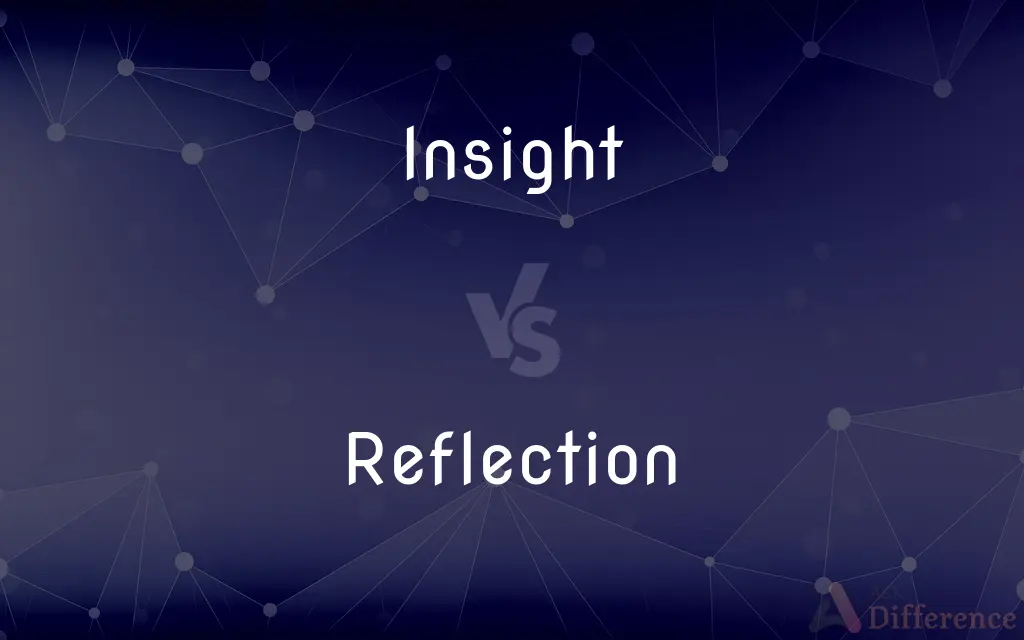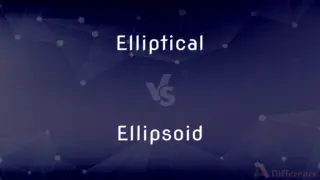Insight vs. Reflection — What's the Difference?
By Tayyaba Rehman & Urooj Arif — Updated on March 17, 2024
Insight involves sudden understanding or discovery, while reflection is a deep, thoughtful consideration of past experiences or information.

Difference Between Insight and Reflection
Table of Contents
ADVERTISEMENT
Key Differences
Insight is the ability to understand the inner nature of things or to see intuitively, often coming as a sudden realization or eureka moment. This can lead to innovative solutions or a deep understanding of complex situations without a lengthy process of logical reasoning. Reflection, on the other hand, involves deliberate thinking and analysis of past events, actions, or information. It's a process of looking back and pondering, which can lead to personal growth, learning from experiences, and better decision-making in the future.
Insight often occurs spontaneously and can seem to come out of nowhere, providing an immediate and clear understanding of something that was previously puzzling. This sudden clarity can be exhilarating and is sometimes triggered by an external event or piece of information that connects the dots in an unexpected way.
Reflection requires time and is characterized by a more methodical and deliberate approach. It's not about immediate clarity but about gradually building understanding and perspective through contemplation. Reflecting on a difficult conversation, for instance, can help one understand the other person's perspective and how to communicate more effectively in the future.
While insight can lead to quick, innovative solutions or understandings, reflection contributes to a deeper, more rounded understanding of oneself and one's experiences. Both processes are valuable for learning and decision-making but serve different purposes and are triggered by different mental states and circumstances.
Comparison Chart
Definition
Sudden understanding or discovery.
Thoughtful consideration of past experiences.
ADVERTISEMENT
Nature
Intuitive and often spontaneous.
Deliberate and methodical.
Outcome
Innovative solutions or understanding.
Personal growth and learning.
Process
Can occur quickly, without deliberate thought.
Requires time and deliberate thought.
Trigger
Often external stimuli or internal connections.
Past experiences or information.
Compare with Definitions
Insight
Insight often bypasses logical analysis.
Her insight into the client's needs came from years of experience.
Reflection
It's a process of learning from one's actions and outcomes.
Through reflection, he understood the consequences of his choices.
Insight
Insights can lead to creative or unconventional solutions.
The scientist's insight led to a groundbreaking discovery.
Reflection
Reflection involves deep thinking about past experiences.
Reflection on her mistakes helped her improve.
Insight
A moment of insight provides immediate understanding.
An insight during a brainstorming session led to a novel solution.
Reflection
Promotes understanding of personal thoughts, feelings, and actions.
Regular reflection enhances her self-awareness.
Insight
Insights are often described as "aha" moments.
The puzzle's solution came to him in a sudden insight.
Reflection
Reflection aids in making more considered decisions.
Reflection on past successes informed his strategy.
Insight
The timing and occurrence of insights can be unpredictable.
The writer's insight for the novel's plot twist came unexpectedly.
Reflection
Reflection is an ongoing part of personal growth.
Continuous reflection is key to her professional development.
Insight
Insight is the understanding of a specific cause and effect within a particular context. The term insight can have several related meanings: a piece of information the act or result of understanding the inner nature of things or of seeing intuitively (called noesis in Greek) an introspection the power of acute observation and deduction, discernment, and perception, called intellection or noesis An understanding of cause and effect based on the identification of relationships and behaviors within a model, context, or scenario (see artificial intelligence)An insight that manifests itself suddenly, such as understanding how to solve a difficult problem, is sometimes called by the German word Aha-Erlebnis.
Reflection
The act of reflecting or the state of being reflected.
Insight
The capacity to gain an accurate and deep understanding of someone or something
His mind soared to previously unattainable heights of insight
Reflection
Something, such as light, radiant heat, sound, or an image, that is reflected.
Insight
The ability to discern the true nature of a situation, especially by intuition.
Reflection
Serious thinking or careful consideration
Engaged in reflection on the problem.
Insight
A perception produced by this ability.
Reflection
A thought or an opinion resulting from such thinking or consideration
Wrote down her reflections.
Insight
A sight or view of the interior of anything; a deep inspection or view; introspection; frequently used with into.
Reflection
An indirect expression of censure or discredit
A reflection on his integrity.
Insight
Power of acute observation and deduction
Reflection
A manifestation or result
Her achievements are a reflection of her courage.
Insight
(marketing) Knowledge (usually derived from consumer understanding) that a company applies in order to make a product or brand perform better and be more appealing to customers
Reflection
The folding of a membrane from the wall of a cavity over an organ and back to the wall.
Insight
Intuitive apprehension of the inner nature of a thing or things; intuition.
Reflection
The folds so made.
Insight
(artificial intelligence) An extended understanding of a subject resulting from identification of relationships and behaviors within a model, context, or scenario.
Reflection
The act of reflecting or the state of being reflected.
Insight
(psychiatry) An individual's awareness of the nature and severity of one's mental illness.
Reflection
The property of a propagated wave being thrown back from a surface (such as a mirror).
Insight
A sight or view of the interior of anything; a deep inspection or view; introspection; - frequently used with into.
He had an insight into almost all the secrets of state.
Reflection
Something, such as an image, that is reflected.
The dog barked at his own reflection in the mirror.
Insight
Power of acute observation and deduction; penetration; discernment; perception.
Quickest insightIn all things that to greatest actions lead.
Reflection
Careful thought or consideration.
After careful reflection, I have decided not to vote for that proposition.
Insight
Clear or deep perception of a situation
Reflection
An implied criticism.
It is a reflection on his character that he never came back to see them.
Insight
A feeling of understanding
Reflection
(computing) The process or mechanism of determining the capabilities of an object at run-time.
Insight
The clear (and often sudden) understanding of a complex situation
Reflection
(anatomy) The folding of a part; a fold.
Insight
Grasping the inner nature of things intuitively
Reflection
The act of reflecting, or turning or sending back, or the state of being reflected.
The eye sees not itself,But by reflection, by some other things.
Reflection
The reverting of the mind to that which has already occupied it; continued consideration; meditation; contemplation; hence, also, that operation or power of the mind by which it is conscious of its own acts or states; the capacity for judging rationally, especially in view of a moral rule or standard.
By reflection, . . . I would be understood to mean, that notice which the mind takes of its own operations, and the manner of them, by reason whereof there come to be ideas of these operations in the understanding.
This delight grows and improves under thought and reflection.
Reflection
Shining; brightness, as of the sun.
Reflection
That which is produced by reflection.
As the sun water we can bear,Yet not the sun, but his reflection, there.
Reflection
A part reflected, or turned back, at an angle; as, the reflection of a membrane.
Job's reflections on his once flourishing estate did at the same time afflict and encourage him.
Reflection
Censure; reproach cast.
He died; and oh! may no reflection shedIts poisonous venom on the royal dead.
Reflection
The transference of an excitement from one nerve fiber to another by means of the nerve cells, as in reflex action. See Reflex action, under Reflex.
Reflection
A calm lengthy intent consideration
Reflection
The phenomenon of a propagating wave (light or sound) being thrown back from a surface
Reflection
Expression without words;
Tears are an expression of grief
The pulse is a reflection of the heart's condition
Reflection
The image of something as reflected by a mirror (or other reflective material);
He studied his reflection in the mirror
Reflection
A likeness in which left and right are reversed
Reflection
(mathematics) a transformation in which the direction of one axis is reversed
Reflection
A remark expressing careful consideration
Reflection
The ability to reflect beams or rays
Common Curiosities
Is one more valuable than the other in problem-solving?
Both are valuable; insights can offer immediate solutions, whereas reflection helps in understanding and learning from past approaches.
How does reflection contribute to personal growth?
By analyzing past actions and their outcomes, reflection helps in understanding oneself better, leading to personal growth.
Can insight occur during reflection?
Yes, insights can occur during reflection as connections between past experiences and current challenges are made.
Is reflection always related to past experiences?
Primarily, yes, reflection involves examining past actions, thoughts, or events to gain insights and learn.
Are there educational methods focused on developing insight?
Yes, educational approaches like inquiry-based learning encourage the development of insight.
How do insights influence creativity?
Insights often break conventional thinking patterns, leading to creative solutions and ideas.
Can insights be cultivated?
While spontaneous, creating conditions conducive to insight, like taking breaks or diverse experiences, can help.
Are there techniques to enhance reflection?
Yes, methods like journaling, meditation, and guided questioning can enhance the depth and quality of reflection.
Is it possible to have too much reflection?
Excessive reflection without action can lead to rumination and hinder progress.
Can reflection lead to negative feelings?
Yes, it can sometimes lead to regret or guilt, but it's an essential step towards learning and growth.
Can group activities lead to insights?
Yes, collaborative environments can spark insights through shared knowledge and perspectives.
How does culture influence reflection and insight?
Cultural values and norms can shape the ways individuals reflect and the types of insights they value.
How do insights contribute to scientific progress?
Insights often lead to hypotheses and theories that push the boundaries of current scientific understanding.
How do professionals use reflection?
Professionals use reflection to analyze their performance, decisions, and outcomes to improve future practices.
Can technology aid in gaining insights or reflection?
Technology, like data analytics and reflective apps, can support insight generation and reflective practices.
Share Your Discovery

Previous Comparison
Elliptical vs. Ellipsoid
Next Comparison
Run vs. RushAuthor Spotlight
Written by
Tayyaba RehmanTayyaba Rehman is a distinguished writer, currently serving as a primary contributor to askdifference.com. As a researcher in semantics and etymology, Tayyaba's passion for the complexity of languages and their distinctions has found a perfect home on the platform. Tayyaba delves into the intricacies of language, distinguishing between commonly confused words and phrases, thereby providing clarity for readers worldwide.
Co-written by
Urooj ArifUrooj is a skilled content writer at Ask Difference, known for her exceptional ability to simplify complex topics into engaging and informative content. With a passion for research and a flair for clear, concise writing, she consistently delivers articles that resonate with our diverse audience.














































